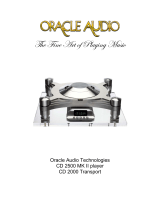
12. Use only with the
cart, stand, tripod,
bracket, or table
specified by the
manufacturer,
or sold with the
apparatus. When
a cart is used,
use caution when moving the cart/
apparatus combination to avoid injury
from tip-over.
13. Unplug this apparatus during lightning
storms or when unused for long
periods of time.
14. Refer all servicing to qualified service
personnel. Servicing is required when
the apparatus has been damaged in
any way, such as when the power-
supply cord or plug is damaged, liquid
has been spilled or objects have fallen
into the apparatus, the apparatus has
been exposed to rain or moisture, does
not operate normally, or has been
dropped.
Disc Storage & Management
●
Holding Discs
- Fingerprints or scratches
on a disc may reduce
sound and picture
quality or cause skipping
- Avoid touching the surface of a disc
where data has been recorded.
- Hold the disc by the edges so that
fingerprints will not get on the
surface.
- Do not stick paper or tape on the disc.
●
Cleaning Discs
- If you get fingerprints
or dirt on a disc, clean
it with a mild detergent
diluted in water and
wipe with a soft cloth.
- When cleaning, wipe gently from the
inside to the outside of the disc.
●
Disc Storage
`
Do not keep in direct sunlight.
`
Keep in a cool ventilated area.
`
Keep in a clean protection jacket
and store vertically.
Handling Cautions
●
Do not expose this apparatus to
dripping or splashing. Do not put
objects filled with liquids, such as vases
on the apparatus.
●
To turn this apparatus off completely,
you must pull the power plug out of
the wall socket. Consequently, the
power plug must be easily and readily
accessible at all times.
●
Do not plug multiple electric devices
into the same wall socket. Overloading a
socket can cause it to overheat, resulting
in a fire
●
Before connecting other components to
this player, be sure to turn them off.
●
If you move your player suddenly
from a cold place to a warm place,
condensation may occur on the
operating parts and lens and cause
abnormal disc playback. If this occurs,
unplug the player, wait for two hours,
and then connect the plug to the power
outlet. Then, insert the disc, and try to
play back again.
●
If the product makes an abnormal noise
or produces a burning smell or smoke,
turn off the power switch immediately
and disconnect the power plug from the
wall outlet. Then, contact the nearest
customer service centre for technical
assistance. Do not use the product.
Using the product as it is may cause a
fire or an electric shock.
Using the 3D function
IMPORTANT HEALTH AND SAFETY
INFORMATION FOR 3D PICTURES.
Read and understand the following safety
information before using the 3D function.
●
Some viewers may experience
discomfort while viewing 3D TV such as
dizziness, nausea, and headaches.
If you experience any such symptom,
stop viewing 3D TV, remove the 3D
Active Glasses, and rest.
●
Watching 3D images for an extended
period of time may cause eye strain. If
you feel eye strain, stop viewing 3D TV,
remove your 3D Active Glasses, and
rest.
●
A responsible adult should frequently
check on children who are using the 3D
function.
If there are any reports of tired eyes,
headaches, dizziness, or nausea, have
the child stop viewing 3D TV and rest.
●
Do not use the 3D Active Glasses
for other purposes (Such as general
eyeglasses, sunglasses, protective
goggles, etc.).
●
Do not use the 3D function or 3D
Active Glasses while walking or moving
around. Using the 3D function or 3D
Active Glasses while moving around may
cause you to bump into objects, trip,
and/or fall, and cause serious injury.
●
If you want to enjoy 3D content,
connect a 3D device (3D compliant AV
receiver or TV) to the player's HDMI OUT
port using a high-speed HDMI cable.
Put on 3D glasses before playing the 3D
content.
●
The player outputs 3D signals only
through HDMI cable connected to the
HDMI OUT port.
●
As the video resolution in 3D play mode
is fixed according to the resolution
of the original 3D video, you can
not change the resolution to your
preference.
●
Some functions such as BD Wise,
screen size adjustment, and resolution
adjustment may not operate properly in
3D play mode.
●
You must use a high-speed HDMI cable
for proper output of the 3D signal.
●
Stay at least three times the width of the
screen from the TV when watching 3D
images. For example, if you have a 46-
inch screen, stay 138 inches (11.5 feet)
from the screen.
●
Place the 3D video screen at eye level
for the best 3D picture.
●
When the player is connected to some
3D devices, the 3D effect may not
function properly.
●
This player does not convert 2D content
into 3D.
●
"Blu-ray 3D" and "Blu-ray 3D" logo
are trademarks of the Blu-ray Disc
Association.
Copyright
© 2014 Samsung Electronics Co.,Ltd.
All rights reserved; No part or whole of
this user's manual may be reproduced
or copied without the prior written
permission of Samsung Electronics Co.,Ltd.
3




















